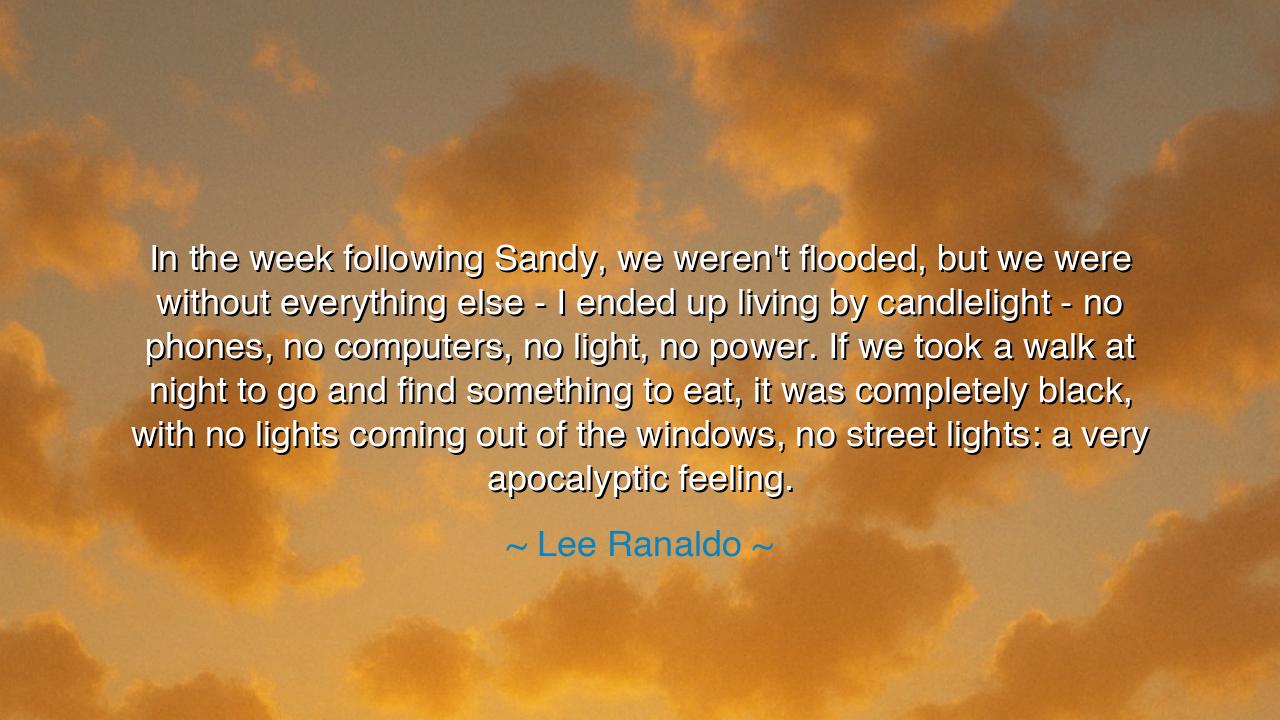
In the week following Sandy, we weren't flooded, but we were
In the week following Sandy, we weren't flooded, but we were without everything else - I ended up living by candlelight - no phones, no computers, no light, no power. If we took a walk at night to go and find something to eat, it was completely black, with no lights coming out of the windows, no street lights: a very apocalyptic feeling.






The words of Lee Ranaldo—“In the week following Sandy, we weren't flooded, but we were without everything else - I ended up living by candlelight - no phones, no computers, no light, no power. If we took a walk at night to go and find something to eat, it was completely black, with no lights coming out of the windows, no street lights: a very apocalyptic feeling.”—resonate with a haunting truth about the fragility of modern life. In this reflection lies a lesson as ancient as human civilization: that the comforts of technology, light, and convenience, which we take for granted, can vanish in an instant, leaving us to confront the raw elements of existence and the vulnerability of our condition.
Ranaldo’s description evokes the profound disorientation of sudden loss, a feeling both physical and spiritual. In the absence of light and power, everyday acts—finding sustenance, moving safely, connecting with others—become small victories, and human resilience is revealed in its simplest form. His experience mirrors the ancient understanding that adversity strips life to its essentials, testing courage, ingenuity, and the bonds between people. To walk in darkness, reliant only on candlelight and instinct, is to feel the weight of mortality, the impermanence of comfort, and the urgent vitality of each choice.
The origin of this quote lies in Ranaldo’s experience in the aftermath of Hurricane Sandy in 2012, when millions faced blackout, isolation, and destruction. Though he escaped the floodwaters themselves, he was plunged into a world without electricity, communication, or modern convenience—a scenario that forced him to confront how dependent society had become on technology. In his recounting, the apocalyptic feeling is not merely aesthetic; it is a revelation of human vulnerability and the fragile scaffolding upon which modern life rests.
History provides parallels that illuminate the lesson. Consider ancient Rome during the great fires, when streets darkened with smoke and the infrastructure of the city was disrupted. Citizens, accustomed to structured life, were forced to rely on improvisation, mutual aid, and resilience. The absence of familiar systems—light, water, communication—reveals both the fragility of society and the latent strength within human communities. Ranaldo’s candlelit walks mirror the courage of those who navigated chaos centuries ago.
Ranaldo’s reflection also underscores a moral and philosophical dimension: gratitude and mindfulness. When stripped of conveniences, the value of light, warmth, communication, and sustenance becomes starkly apparent. The apocalyptic darkness forces recognition of how intertwined human life is with both nature and technology. It teaches the lesson that comfort is never absolute, that preparedness and humility are virtues, and that resilience is cultivated in anticipation of the unforeseen.
Consider a modern example of similar disruption: the 2003 Northeast blackout, when tens of millions lost power across cities, forcing families to rediscover community, patience, and improvisation. People lit candles, shared resources, and navigated darkened streets with care. In those hours, ordinary lives became extraordinary exercises in ingenuity and human solidarity. Ranaldo’s personal recounting of Sandy reflects this same principle: adversity reveals character, adaptation, and the human capacity to endure.
The lesson embedded in his words is timeless: the structures and conveniences of modern life, though powerful, are fragile. We must cultivate adaptability, self-reliance, and the awareness that comfort can vanish without warning. Candlelight, darkness, and the absence of technology strip life to essentials, revealing both our vulnerabilities and our strengths. In these moments, we see clearly what is most essential: courage, creativity, connection, and gratitude.
And so, my children, remember this eternal guidance: do not take comfort or technology for granted. Prepare, adapt, and cultivate resilience. Cherish light, warmth, and sustenance, and honor the small victories of daily life. When darkness descends, whether literal or metaphorical, walk with courage, share with others, and find strength in your own ingenuity. As Lee Ranaldo reminds us, even in apocalyptic moments, the human spirit can navigate, endure, and illuminate the night.






AAdministratorAdministrator
Welcome, honored guests. Please leave a comment, we will respond soon